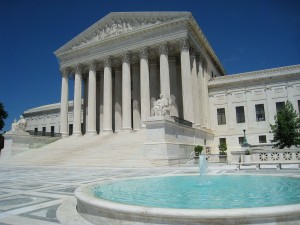Debunking the Process of Federal Appeals: What You Required to Know
Browsing the elaborate world of government appeals can typically seem like going across uncharted waters for those not familiar with the process. Understanding the nuances of appellate court territory, the intricacies of filing a notification of allure, providing an engaging short, and making an influential oral disagreement are important components that can considerably affect the result of a case. By untangling the layers of complexity bordering government appeals, individuals can gain a more clear understanding into the systems that regulate this critical point of the lawful system.
Recognizing Federal Appeals Refine
Looking into the intricate world of the government charms process reveals a methodical and structured journey via the judicial system - federal appellate attorney new mexico. Federal appeals work as a crucial mechanism for reviewing decisions made by lower courts. Comprehending this process is vital for anybody involved in lawful proceedings at the federal level
The procedure generally starts with a party dissatisfied with a reduced court's judgment filing a notification of charm. This causes an evaluation by a higher court, where a panel of courts analyzes the legal disagreements presented by both celebrations. Briefs detailing the legal reasoning behind each party's placement are sent, and dental arguments might be heard to make clear complex problems.
The appellate court's choice is based on a complete exam of the reduced court's process and the arguments provided. As soon as the appellate court reaches a decision, it can affirm, reverse, remand, or customize the reduced court's judgment, providing clearness and finality to the legal disagreement.
Appellate Court Territory Explained

Appellate courts have jurisdiction over certain sorts of cases, commonly those involving lawful errors, procedural issues, or concerns of law instead than accurate conflicts. The territory of appellate courts is typically described in statutes and regulations that govern the court system. Comprehending appellate court territory is crucial for parties included in the allures procedure as it determines whether a situation is qualified for evaluation and the level to which the appellate court can interfere in the reduced court's choice.
Filing a Notification of Appeal
The first step in commencing the government appeals process includes filing a Notification of Allure with the appropriate appellate court. alaska federal appeal attorneys. This crucial document formally notifies the court and the various other parties included in the instance that the appealing event intends to look for a review of the lower court's choice. Submitting a Notification of Appeal is a rigorous procedural need that sets the appellate procedure in activity
When preparing the Notification of Charm, it is vital to guarantee conformity with the certain policies and guidelines of the appropriate appellate court. The record should commonly include info such as the case name, the lower court's name, the day of the judgment being appealed, and a concise declaration indicating the grounds for the allure.
When filing a Notice of Allure,Timeliness is of the essence. Missing out on the due date for submitting this record can lead to the appeal being dismissed, underscoring the significance of precise and punctual initiation of the appeals process. It is a good idea to look for lawful support to navigate the intricacies of submitting a Notification of Charm efficiently.
Briefing and Oral Disagreement
In the appellate process, providing written briefs and participating in dental disagreements play critical roles in promoting for the appealing event's position prior to the appellate court. Briefs are detailed lawful records that lay out the parties' arguments, legal authorities, and analysis sustaining their settings. These created entries supply the court with a detailed understanding of the truths of the instance, the appropriate legislation, and why the appealing celebration thinks the reduced court's choice need to be rescinded.
Adhering to the entry and evaluation of the briefs, dental arguments provide the parties a chance to additional clarify their settings, deal with any type of concerns the appellate judges might have, and emphasize crucial factors from their composed briefs. Oral arguments are a chance for the lawyers to convince the judges through verbal campaigning for and actions to queries from the bench.

Receiving the Appellate Court Choice

Conclusion
Comprehending the appellate court jurisdiction, submitting a notification of allure, preparing briefs, and offering oral arguments are all important components of this procedure. Inevitably, receiving the appellate court decision can supply quality and resolution to legal conflicts.
As we proceed from comprehending the government appeals process to exploring the intricacies of appellate court jurisdiction, an essential element comes to light relating to the authority and restrictions of these greater courts in the lawful landscape. Appellate court territory refers to the extent of instances that a certain appellate court has the power to review and choose upon. Unlike trial courts that hear situations for the very first time, appellate courts are restricted to reviewing decisions made by lower courts. Comprehending appellate court jurisdiction is important for celebrations involved in the appeals procedure as it determines whether an instance is qualified for testimonial and the level to which the appellate court can interfere in the lower court's choice.
Whether the appellate court verifies, turns around, or remands the reduced court's decision, comprehending the effects of the ruling is essential for all celebrations entailed in the appellate process.